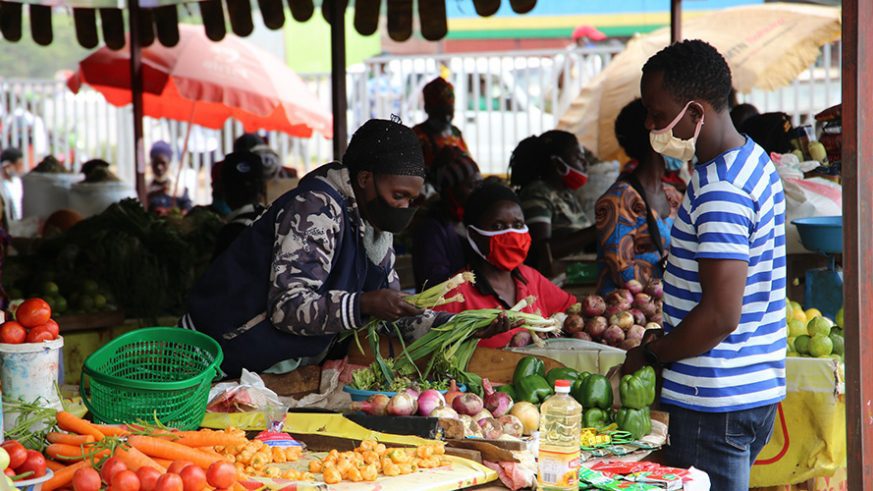For the past few months, Beatrice Mutoni has been selling fresh fruits and vegetables on a busy stand at one of the Rwandan capital’s central markets located at Nyabugogo.
Mutoni has been buying up fresh food products directly from local growers across the country, and cleaning them before selling them to consumers.
“The last bulk sale was made at the time we were allowed to operate inside the market , but since our eviction we are worried because we are no longer able to deliver to consumers with fresh produce,” Mutoni told APA in Kigali.
Earlier this week, Rwandan authorities decided to close two main city markets for one week as the government seeks to control a sudden spike in new infections in Kigali.
The decision comes after the government said that the 253 people who have tested positive for Covid-19 in the country since last week were mostly people from the two closed markets.
Commenting on the decision, the Mayor of Kigali, Pudence Rubingisa explained that such a lockdown is a hard but necessary decision.
“People need to know that if the numbers continue to rise, there are some hard decisions that will have to be made,” the Rwandan municipality official said.
Some farmers in remote rural Rwanda have well-established markets Kenyan enterprises depend on but they face an uncertain future with the unprecedented closure of learning institutions.
Dealers in the selling of these fresh produces like Mutoni are desperately trying to survive losses occasioned by the newly imposed lockdown measures.
Mutoni said that she had been forced to make adjustments to her lifestyle to bear the negative effects of COVID-19 lockdown.
“I used to order large quantity of fresh fruits and vegetables from farmers with hope to get customers coming on my way but since the repetitive lockdown measures have significantly affected my business,” said Mutoni.
Earlier this month the prospects of the revival of these businesses took a turning point after commercial banks in Rwanda devised strategies to support the economy in the wake of the pandemic.
The raft of interventions that have since been rolled out include easing loan repayment conditions for borrowers whose incomes have been severely affected by the virus including fruit and vegetable vendors in Rwanda’s urban informal sector.
The move comes after the National Bank of Rwanda (BNR) announced in March this year a Rwf50 billion (53 million USD) stimulus package for local banks, which they will access in the form of loans.
Despite appeals by the business community affected by new lockdown measures, Rwandan health authorities say that tests within all the markets in Kigali and other high-risk zones will kick off this week to determine the next steps which may as a last resort see the imposition of another lockdown.
“A lockdown is a hard but worthwhile decision. People need to know that if the numbers continue to rise, there are some hard decisions that will have to be made,” Rwandan minister of Health, Dr Daniel Ngamije told reporters earlier this week in Kigali.
Across major markets in Kigali city, vendors of fruit, vegetable and other perishable food products account for the largest group of vendors, according to the estimates from the ministry of Commerce and Industry.
In the mean time, few wholesale and retail traders in Kigali have been allowed to operate at strict condition respecting recommended social distancing measures to protect against COVID-19.
“People have been instructed to stand in circles outside shops to maintain social distancing when we will be allowed to resume business,” Mutoni said.
CU/as/APA


